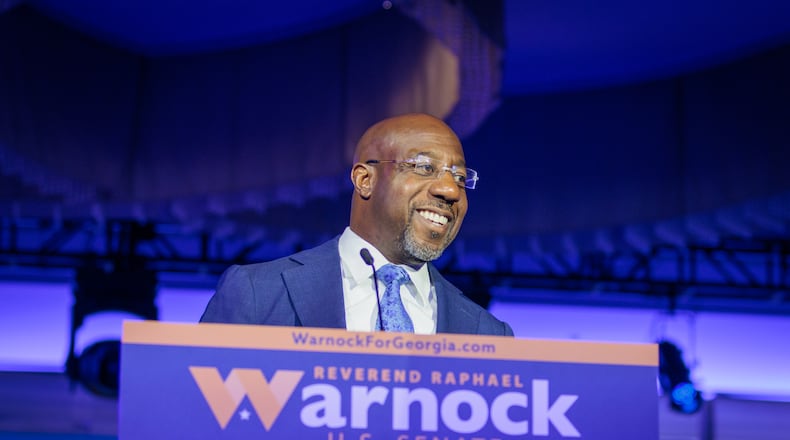Across the nation, many wondered how U.S. Sen. Raphael Warnock was dragged into a runoff despite Republican Herschel Walker’s personal baggage and troubles on the campaign trail.
But the more telling question might be how Warnock avoided an outright defeat on Tuesday even as every other statewide Democratic candidate wiped out.
Warnock and Walker will square off in a nationally watched Dec. 6 runoff that will once again test each campaign’s stamina, fundraising chops and get-out-the-vote machines — along with the endurance of exhausted Georgia voters. Depending on how other tight races shake out, the runoff could determine control of the U.S. Senate.
The four-week overtime will also pose a unique challenge to Warnock, who lived to fight another day even as Stacey Abrams and other Democratic contenders were handily dispatched by Republican rivals.
Warnock must persuade supporters who have voted for him in four elections since 2020 to participate in a fifth. And just as he did in the last round, the pastor will try to blunt Walker’s attempt to make the race a referendum on President Joe Biden, whose low approval ratings weighed down Democrats.
“At the end of the day, we knew if we made this a character conversation — with the reverend versus the running back — we’d have a fair chance,” said Quentin Fulks, Warnock’s campaign manager.
‘Remaining the Reverend’
That strategy was clear at campaign stops and in media interviews where he focused on his bipartisan work — an interstate highway project with Republican U.S. Sen. Ted Cruz of Texas was a favorite example — and skirted mention of Biden.
It was part of a concerted effort by Warnock to peel off swing voters who were wary of Walker. And Tuesday’s results indicated that swing-ticket effect was a decisive factor in the November ballot. Warnock outpolled Abrams by about 3 percentage points — the difference between a runoff and an outright defeat.
“It’s a testament to the strength of his personal appeal and record,” said Fred Hicks, a Democratic strategist who also pointed to GOP victories by Gov. Brian Kemp and Secretary of State Brad Raffensperger.
“The one consistent point,” Hicks said, “is that Georgia rewarded people who performed over personality-driven campaigns.”
Credit: Hyosub Shin/AJC
Credit: Hyosub Shin/AJC
Walker, meanwhile, built his case for election on Warnock’s links to Biden. His attacks painted the Democrat as a Biden lackey whose 2021 runoff win allowed the president’s agenda to move forward. He framed a GOP victory as a vote against Biden and Democratic control of the Senate.
“Raphael Warnock votes with Joe Biden 96% of the time,” Walker said at campaign events, adding that he has “forgotten about the people of Georgia.”
Warnock avoided emphasizing Walker’s history of violent behavior until late in the race. He also initially steered clear of allegations that Walker pressured two women into having abortions despite his calls for a ban on the procedure. The Republican has called those claims a “flat-out lie” designed to damage his chances.
Warnock’s critics say that restrained approach may have cost him a chance to damage Walker in the rough-and-tumble Senate race. But Fulks said the campaign wasn’t going to “turn on a dime” and change its calculated plan.
“To be clear: There are a number of things that we knew about in Herschel Walker’s past two years ago,” Fulks said. “But part of this is remaining the Reverend and reminding people that they want him to represent their families.”
‘Person, not party’
On the same February day Warnock’s first TV ad of the 2022 cycle debuted, his campaign also launched its voter mobilization program — something many candidates wait to begin until weeks before an election. But with a fundraising edge of roughly $70 million over Walker, the Democrat could afford to innovate.
The operation specifically reached out to cord-cutters who canceled their cable subscriptions by spending nearly $6 million on YouTube ads — more than twice as much as any other Senate contender.
The campaign also pumped more money into Snapchat ads than any other Senate candidate. And it created an augmented reality filter to show voters what they’d look like wearing a Vote Warnock shirt. In all, the campaign promoted 500 unique digital ads, each in multiple optimized formats.
Meanwhile, canvassers knocked on 2.3 million doors and logged at least 8.3 million phone calls to voters to support his candidacy. The campaign’s volunteer program completed nearly 20,000 shifts.
Warnock and his allies are working to rev up the machinery again, leaning into his argument that he’s a unique candidate who can withstand electoral headwinds that sent other Democrats into a tailspin.
“We’re confident people are looking at the person — not the party,” Fulks said.
Credit: Greg Nash/The Hill
Credit: Greg Nash/The Hill
About the Author
Keep Reading
The Latest
Featured







